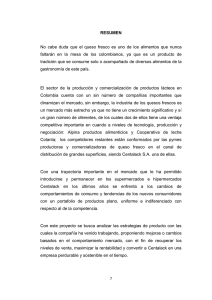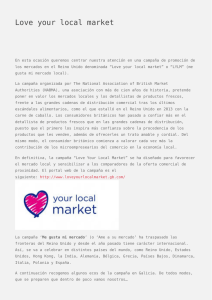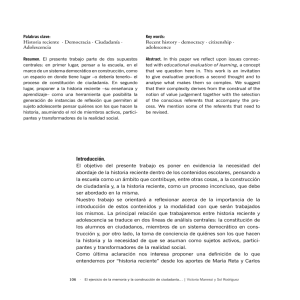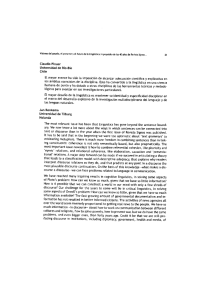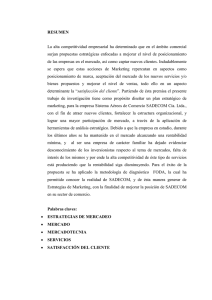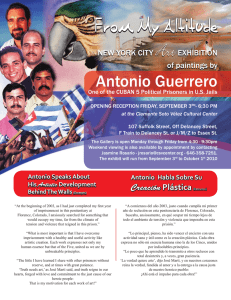September 18, 2016
Anuncio
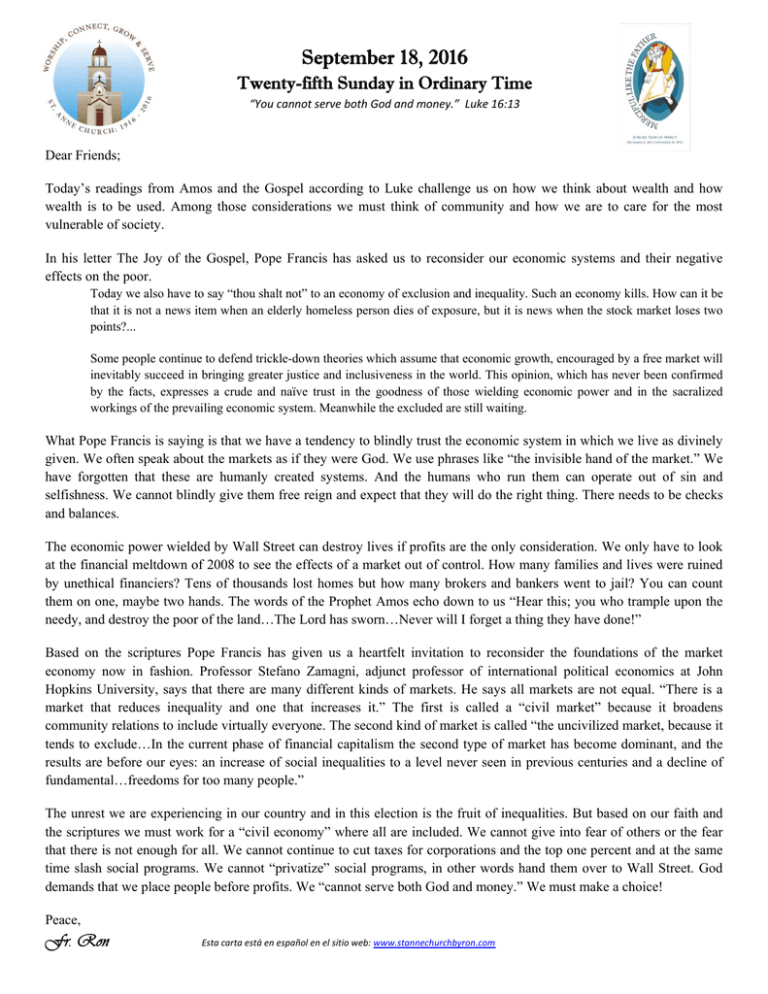
September 18, 2016 Twenty-fifth Sunday in Ordinary Time “You cannot serve both God and money.” Luke 16:13 Dear Friends; Today’s readings from Amos and the Gospel according to Luke challenge us on how we think about wealth and how wealth is to be used. Among those considerations we must think of community and how we are to care for the most vulnerable of society. In his letter The Joy of the Gospel, Pope Francis has asked us to reconsider our economic systems and their negative effects on the poor. Today we also have to say “thou shalt not” to an economy of exclusion and inequality. Such an economy kills. How can it be that it is not a news item when an elderly homeless person dies of exposure, but it is news when the stock market loses two points?... Some people continue to defend trickle-down theories which assume that economic growth, encouraged by a free market will inevitably succeed in bringing greater justice and inclusiveness in the world. This opinion, which has never been confirmed by the facts, expresses a crude and naïve trust in the goodness of those wielding economic power and in the sacralized workings of the prevailing economic system. Meanwhile the excluded are still waiting. What Pope Francis is saying is that we have a tendency to blindly trust the economic system in which we live as divinely given. We often speak about the markets as if they were God. We use phrases like “the invisible hand of the market.” We have forgotten that these are humanly created systems. And the humans who run them can operate out of sin and selfishness. We cannot blindly give them free reign and expect that they will do the right thing. There needs to be checks and balances. The economic power wielded by Wall Street can destroy lives if profits are the only consideration. We only have to look at the financial meltdown of 2008 to see the effects of a market out of control. How many families and lives were ruined by unethical financiers? Tens of thousands lost homes but how many brokers and bankers went to jail? You can count them on one, maybe two hands. The words of the Prophet Amos echo down to us “Hear this; you who trample upon the needy, and destroy the poor of the land…The Lord has sworn…Never will I forget a thing they have done!” Based on the scriptures Pope Francis has given us a heartfelt invitation to reconsider the foundations of the market economy now in fashion. Professor Stefano Zamagni, adjunct professor of international political economics at John Hopkins University, says that there are many different kinds of markets. He says all markets are not equal. “There is a market that reduces inequality and one that increases it.” The first is called a “civil market” because it broadens community relations to include virtually everyone. The second kind of market is called “the uncivilized market, because it tends to exclude…In the current phase of financial capitalism the second type of market has become dominant, and the results are before our eyes: an increase of social inequalities to a level never seen in previous centuries and a decline of fundamental…freedoms for too many people.” The unrest we are experiencing in our country and in this election is the fruit of inequalities. But based on our faith and the scriptures we must work for a “civil economy” where all are included. We cannot give into fear of others or the fear that there is not enough for all. We cannot continue to cut taxes for corporations and the top one percent and at the same time slash social programs. We cannot “privatize” social programs, in other words hand them over to Wall Street. God demands that we place people before profits. We “cannot serve both God and money.” We must make a choice! Peace, Fr. Ron Esta carta está en español en el sitio web: www.stannechurchbyron.com 18 de Septiembre, 2016 Vigésimo-quinto Domingo en Tiempo Ordinario "No puedes servir a Dios y al dinero." Lucas 16:13 Queridos amigos; Las lecturas de hoy de Amos y el Evangelio según Lucas nos desafían en cómo pensamos acerca de la riqueza y cómo la riqueza debe ser utilizada. Entre esas consideraciones debemos pensar en la comunidad y cómo debemos cuidar a los más vulnerables de la sociedad. En su carta la Alegría del Evangelio, El Papa Francisco nos ha pedido que reconsideremos nuestros sistemas económicos y sus efectos negativos sobre los pobres. Hoy también tenemos que decir "yo renuncio" a una economía de exclusión y desigualdad. Tal economía mata. ¿Cómo puede ser que no sea noticia cuando muere un anciano sin hogar por estar expuesto al frio y los elementos, pero si es noticia cuando la bolsa pierde dos puntos?... Algunas personas seguirán defendiendo las teorías que asumen que el crecimiento económico, impulsado por un mercado libre inevitablemente logrará llevar a una mayor justicia e inclusión en el mundo. Esta opinión, que nunca ha sido confirmada por los hechos, expresa una confianza voluble en bondad de las personas con poder económico y en el funcionamiento sacralizado del sistema económico imperante. Mientras tanto que los excluidos siguen esperando. Lo que Papa Francisco está diciendo es que tenemos una tendencia a confiar ciegamente en el sistema económico en que vivimos como divinamente dado. A menudo hablamos de los mercados como si fueran Dios. Utilizamos frases como "la mano invisible del mercado". Hemos olvidado que estos son sistemas humanamente creados. Y los seres humanos que los manejan lo pueden hacer con egoísmo y avaricia. No podemos darles ciegamente el reinado y esperar que hagan lo correcto. Tiene que existir control y equilibrio. El poder económico de Wall Street puede destruir vidas si los beneficios son la única consideración. Sólo tenemos que mirar la crisis financiera de 2008 para ver los efectos de un mercado fuera de control. ¿Cuántas familias y vidas fueron arruinadas por financistas no éticos? Decenas de miles perdieron sus hogares, pero ¿cuántos corredores y banqueros fueron a la cárcel? Se puede contar en las mano os de uno, quizás dos. Las palabras del profeta Amos hacen eco en las nuestras "oigan esto; ustedes que pisotean a los necesitados y destruyen a los pobres de la tierra... El Señor ha jurado... Nunca olvidaré lo que han hecho!" Basado en las escrituras el Papa Francisco nos ha dado una sincera invitación a reconsiderar los fundamentos de la economía de mercado que está ahora de moda. El Profesor Stefano Zamagni, profesor de economía política internacional en la Universidad de John Hopkins, dice que hay muchos diferentes tipos de mercados. Dice que no todos los mercados son iguales. "Hay un mercado que reduce la desigualdad y una que la aumenta". El primero se llama un «mercado civil» porque amplía las relaciones de la comunidad para incluir a casi todo el mundo. El segundo tipo de mercado se llama "el Mercado incivilizado, ya que tiende a excluir... En la fase actual del capitalismo financiero el segundo tipo de mercado se ha convertido en el dominante, y los resultados están ante nuestros ojos: un aumento de las desigualdades sociales a un nivel nunca visto en siglos anteriores y una disminución de fundamental... libertad para demasiadas personas. " Los disturbios que estamos experimentando en nuestro país y en esta elección son el fruto de las desigualdades. Pero basados en nuestra fe y en las escrituras debemos luchar por una "economía civil" donde todos están incluidos. No podemos ceder al miedo a los demás o el temor de que no hay suficiente para todos. No podemos continuar reduciendo los impuestos a las empresas y del uno por ciento y, al mismo tiempo, recortar los programas sociales. No podemos "privatizar" los programas sociales, en otras palabras, entregarlas a Wall Street. Dios nos exige poner a la gente antes que los beneficios. Nosotros "no podemos servir a Dios y al dinero". ¡Debemos de elegir! Paz, Fr. Ron Esta carta está en español en el sitio web: www.stannechurchbyron.com
